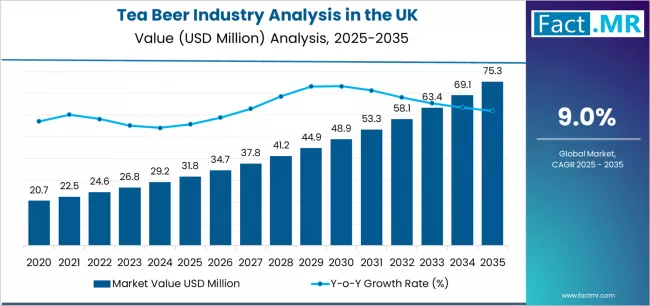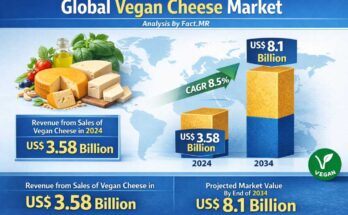The tea beer industry in the UK is experiencing increasing attention as consumers seek innovative alcoholic beverages that combine the traditional appeal of tea with the enjoyment of beer. Tea beer, including ready-to-drink lagers, hybrids, and craft tea ales, offers unique flavor profiles and premium drinking experiences, making it a growing segment within the UK beverage landscape. The rising demand reflects a blend of cultural fusion, craft beverage trends, and wellness-conscious consumption patterns.
Market Overview:
Tea beer merges the healthful and aromatic qualities of tea with the fermentation process of beer, creating a distinctive product category. It is popular in pubs, bars, restaurants, and retail outlets, offering both traditional beer drinkers and adventurous consumers an alternative experience. The market includes ready-to-drink tea lagers and hybrids, fermented tea ales, and specialty craft tea beers. Innovation in flavor, brewing techniques, and beverage presentation continues to drive adoption in both urban and regional markets.
Regional Insights:
England is at the forefront of tea beer consumption and innovation, serving as a hub for craft breweries and beverage experiments. Scotland, Wales, and Northern Ireland also contribute to market growth, with hospitality sectors playing a critical role in promoting experiential drinking. The on-trade segment, including bars and restaurants, remains vital as it provides venues for consumers to explore premium and culturally authentic beverage offerings.
Key Trends & Forecast:
- Ready-to-Drink Tea Lagers & Hybrids Leading:
Ready-to-drink products dominate the UK tea beer market due to convenience, consistent flavor, and ease of integration into hospitality and retail channels. These beverages cater to consumers seeking accessible, high-quality craft options without sacrificing taste or experience. - Craft Beverage Innovation:
The craft segment emphasizes experimentation with tea varieties, blending techniques, and brewing technologies. Breweries are leveraging premium tea ingredients to enhance flavor complexity, support cultural authenticity, and differentiate products from traditional beer offerings. - On-Trade Dominance:
Bars, pubs, and hospitality venues drive the majority of tea beer consumption. On-trade settings provide opportunities for direct consumer engagement, premium pricing, and experiential drinking, encouraging the adoption of innovative tea beer products. - Integration of Wellness and Flavor Profiles:
Tea beer appeals to health-conscious consumers through the use of natural tea extracts, functional ingredients, and lower-alcohol formulations. The combination of wellness-oriented elements with unique taste experiences supports broader market adoption. - Sustainability and Local Sourcing:
Breweries are increasingly focusing on sustainable sourcing, ethical production, and environmentally friendly packaging. Local tea sourcing and craft production methods enhance authenticity and consumer appeal while supporting regional economies.
Applications & End-Use Outlook:
Tea beer finds primary application in hospitality settings, including pubs, restaurants, and premium bars. It is also gaining traction in retail channels through ready-to-drink formats and specialty craft offerings. Consumer preference for unique, premium beverages drives demand for both on-trade and off-trade solutions. Venues benefit from increased footfall, higher margin opportunities, and the ability to offer culturally diverse beverage experiences.
Industry Drivers:
The UK tea beer market is propelled by growing consumer interest in fusion beverages, the popularity of craft brewing, and the desire for novel drinking experiences. Increased urbanization, premiumization of alcoholic beverages, and the cultural integration of tea as a flavorful ingredient further support market growth. Breweries continue to invest in advanced brewing technologies, quality assurance systems, and flavor development to meet evolving consumer expectations.
Competitive Landscape:
Key players in the UK tea beer industry include both established global brewers and local craft companies. Leading breweries focus on flavor innovation, product reliability, and strategic distribution through on-trade and retail channels. Collaborations with hospitality providers and beverage specialists enable these companies to deliver unique products while maintaining high quality standards. Innovation, sustainability, and cultural authenticity are central to maintaining competitiveness in this emerging segment.
Conclusion:
The tea beer market in the UK is a dynamic and growing segment within the beverage industry, combining traditional tea culture with modern craft beer innovations. The market’s growth is driven by ready-to-drink lagers, hybrids, and specialty craft products, particularly in on-trade venues where experiential drinking is emphasized. As consumer demand for premium, culturally authentic, and wellness-oriented beverages increases, tea beer is poised to remain a key focus for breweries, hospitality providers, and beverage innovators seeking differentiation and sustainable growth.
Browse Full Report – https://www.factmr.com/report/united-kingdom-tea-beer-industry-analysis



